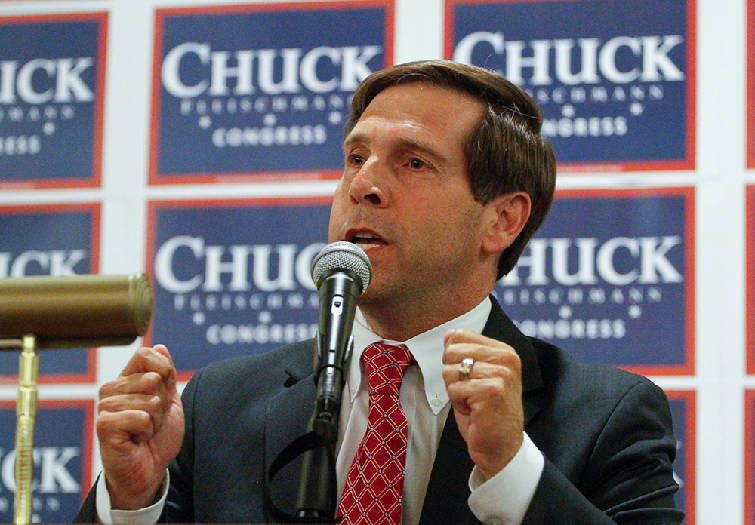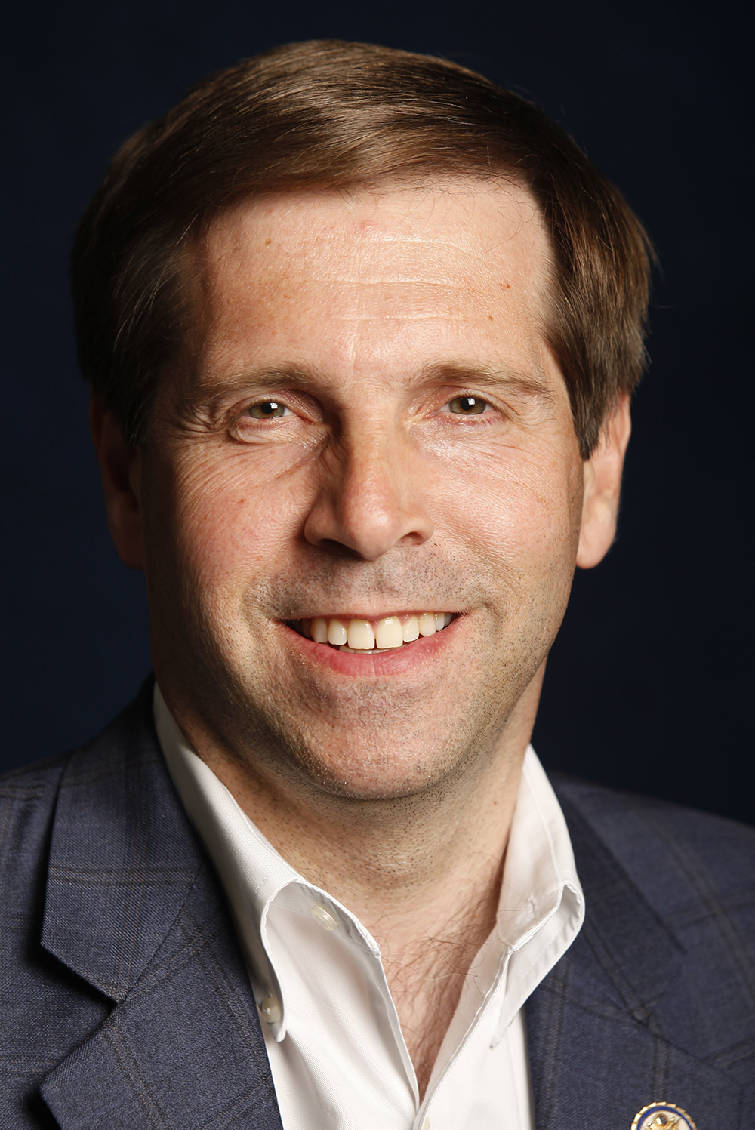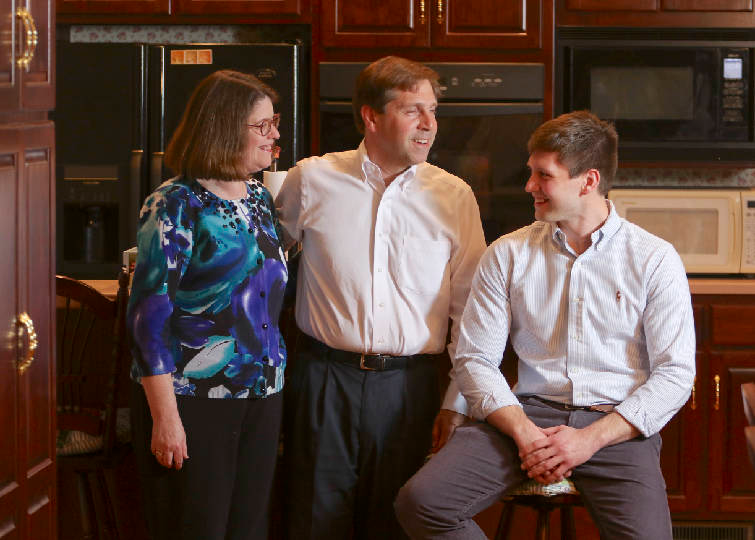
Let the record show: only four left-handers since 1950 have played second base in Major League Baseball.
There are good reasons for this.
The mechanics of baseball dictate that infielders catch the ball, plant their feet and throw in a smooth confluence of motions. Anything that adds a millisecond to this process throws off the Swiss-watch precision of the game and makes put-outs at first base more difficult.
A left-handed second baseman will often find himself in the untenable position of having to turn his back on first base to stab at a ground ball and then spin and replant his feet to make a balanced throw to first. Meanwhile, a fast base-runner will take advantage of this tangled chain of events.
The word that best describes left-handed second basemen is "awkward." In fact, the mere sight of a lefty at the second sack will cause a knowledgeable baseball fan to frown.
Chuck Fleischmann, the United States representative from Tennessee's sprawling 3rd congressional district, is a left-handed second baseman on Congress' GOP baseball team.
For any student of Tennessee Valley politics, the irony is obvious.
Critics of the conservative Fleischmann often ding him on style points. He isn't a polished public speaker, they say. He's not a relaxed retail politician in the manner of, say, a Bill Clinton or a Ronald Reagan, they insist. His necktie is not always knotted perfectly. The guy has unruly hair, for gosh sakes.
To sum it up: He seems on the surface to be, well, a bit tense.
But what his critics and political opponents sometimes miss is another sports analogy.
It is very hard for a conventional, right-handed boxer to beat a lefty.
For the righty it's like punching at himself in a mirror. Every movement of his southpaw opponent feels backwards. To the lefty the feeling is natural, because he goes up against righties all the time.
Fleischmann, 52, would no doubt prefer the boxing analogy to the baseball analogy. He seems aware that people see him as unpolished, or at least that they underestimate his grit. And he has been able to turn this self-awareness to his advantage. He'll take winning over style points any day.
"I've been told 'I can't' all my life," Fleischmann says, flatly. "Can't go to college. Can't go to law school. Can't start a business."
And "can't" went double for winning a seat in Congress.
"When I announced, people thought it was a joke or a misprint," he said.
Now, settling into his third term in the House of Representatives with no election on the immediate horizon, Fleischmann seems to be growing more comfortable in his own skin. He invited Chatter into his golf-community home in Ooltewah recently for a wide-ranging discussion about his life, his family and his passions.
Blue State Beginnings

Among the things you don't know about Chuck Fleischmann are: A.) He is a distant cousin to Harry Houdini. B.) One of his favorite movies is The Godfather. C.) He collects spoons.
Here's another fact you might not know: For all of his red state political impulses, Fleischmann is a child of blue state metropolises. Born in New York City in 1962 to Depression-era parents, Fleischmann, at points in his life, lived in both Chicago and Philadelphia.
His mother, Rose Marie, was the daughter of steadfastly Catholic-Italian immigrants, and his father Max's parents were English and Austro-Hungarian. Chuck was an only child, and he was the apple of his mother's eye. His father Max was a purchasing agent in the food services industry and traveled a lot. A hard worker, his dad—who stood 5 feet 2 inches tall and had one bad eye—could never seem to catch a break in the corporate world. "If there was a bad break to get, he got it," Fleischmann remembers.
Meanwhile, Rose Marie worked for the telephone company in New York and was known for having perfect diction. She doted on her only child, Chuck. When he was young they would play the "Word Power" game in Reader's Digest, and by third grade Chuck had developed an adult-level vocabulary.
When Chuck was 9 years old his mother was diagnosed with breast cancer. She responded to treatments in the beginning, but the cancer roared back when her son was 11. When Chuck was 13, just a freshman in high school, his mother passed away. "I didn't realize until the last stages of cancer, until she maybe had a month to live, that it was a terminal diagnosis," Fleischmann says.
Max, by then 51, was suddenly a heartbroken single man with a young son to raise. He and Chuck bounced around, from New York to Chicago, and beyond. Up until he passed away at age 87 in 2013, Max still couldn't talk about Rose Marie's death without getting emotional. He never remarried but would go on to play an integral role in the family life of his son and grandsons. Although father and son didn't have much in the way of material goods in the early years, Fleischmann says his dad always stressed to him the importance of education and squirreled away what he could to help his son pay for college.
The College Years

Like many first-generation college students, Fleischmann didn't know the finer points of picking an institution of higher learning. A graduate of Elk Grove High School, located about 20 miles northeast of Chicago near O'Hare International Airport, Fleischmann assumed his only option was his state college, the University of Illinois.
At the University of Illinois, Fleischmann applied himself to his political science studies. He worked three jobs on the side and earned an undergraduate degree in just three years. "I waited a lot of tables in my time and mopped a lot of floors," he says now, while pouring coffee for a visitor at his two-story brick home in Ooltewah. As a young man, Fleischmann was beginning to form the character traits that would later lead to business success and inform his political views. In a nutshell, he discovered the transformative power of a common, four-letter word — W-O-R-K.
At age 20, Fleischmann began his course work at the University of Tennessee College of Law in Knoxville. He noticed immediately that he seemed to have more in common, philosophically, with his classmates from the South than with some of the people he grew up with in New York and Chicago.
"It was like an answer to prayer," Fleischmann says. "I fit in. My values were a perfect match. I had lived in places that were far more liberal in their perception."
Todd Moody, a Knoxville attorney who attended law school with Fleischmann, remembers him as outgoing — a natural glad-hander who would greet people with the endearingly over-starched phrase: "I'm great, Sir, how are you?" "There has always been a kind of sincere quality about Chuck," says Moody, who is godfather to one of Fleischmann's three sons. "I immediately liked him."
Moody recalls that Fleischmann took quickly to Southern ways, including the deification of college football. "He would get ecstatic at Tennessee football games," Moody says. He also became known for his dry wit and his ability to mimic his friends. "He's completely self-deprecating," Moody notes.
While at UT law school, Fleischmann met his future wife, Brenda, a soft-spoken law student from Chattanooga who had an undergraduate degree in business. They met when Brenda sat down beside Chuck one day in a seat meant for a friend. "My buddy was late, but I didn't want to be rude," Fleischmann recalls.
They later began dating, and the rest now seems like destiny. Brenda, reserved and organized, was the perfect partner for Chuck, who is an outgoing, big-picture guy. Together, they formed a balanced pair.
Building a Business

After law school, the Fleischmanns moved to Chattanooga and set out to build a law firm together. Brenda, a graduate of Hixson High School, would handle the books and run the office, while Chuck would be the rainmaker, scouting for business as a specialist in debt collection. He soon discovered that he could channel his energy and capacity for hard work into an entrepreneurial vision for his practice.
"We had no money and no debt, and we didn't know what we were doing," Fleischmann muses now.
His pitch to businesses: Hire me and you'll owe me nothing unless I collect. "It was a contingency-driven business," he says. In some ways, he was swimming upstream. Not a native of the city, and with no network of friends and associates to lean on, Fleischmann built a business on a foundation of determination and hard work. He became president of the Chattanooga Bar Association in 1996, which was something of a validation for an "outsider" in a town known for being insular socially and professionally. Notably, he was the youngest president in the local bar association's history.
Starting a law business from scratch requires a healthy amount of delayed gratification. Fleischmann says he was teased early in his law career by other attorneys who noticed that he was too thrifty—some might say cheap—to buy a photocopy machine. Instead, he made daily trips to a print shop to have documents copied, sometimes paying with change out of his pocket.
"I couldn't afford a copier and wouldn't borrow the money to buy one," he explains. "We would never buy anything unless we could afford it."
On some level, Fleischmann also learned lessons about the nature of debt from his law practice. He also became a diplomat, often befriending the very people whom he was collecting money from. "We had people who owed us money, bring us Christmas cards," he remembers. "The profession of law is adversarial, and I always tried to make it less adversarial."
Meanwhile, even as a young attorney, he often shared big dreams with his friends and family. He told people he wanted to try politics someday.
Starting a Family

In the 1980s, the Fleischmanns wanted to start a family but struggled with fertility issues. One day, Chuck was reading the Chattanooga Times and happened upon an article about a new surgical procedure that was helping some women to conceive. The couple followed up with a local doctor and in 1989, their first son, Charles, was born. Three years later James came along, and five years after that a third son, Jeffrey.
The two oldest boys, Charles, now 26, and James, 23, have followed in their father's footsteps studying law. Charles, known to family and friends as "Chuckie," is a practicing attorney in Washington, D.C., and lives with his dad in a basement apartment there. James, is still in law school at the University of Alabama, and Jeffrey attends high school at Silverdale Academy in Chattanooga.
"I never thought they'd even choose law as a profession," says Brenda.
"I grew up around the law," James, who goes by "Jamie," explains. "I just find the law fascinating. I think it's an admirable profession."
Fleischmann says each of his sons has a different personality.
Charles attended Baylor School and is known in the family as a serious-minded young man who likes to stay up late at night with his dad in Washington having deep discussions about politics and life. When he goes off to his law job each day, the congressman admits to having flashbacks about his son in elementary school. "I still give him his coat and slip him a few bucks," he says smiling.
James attended prep school at McCallie and later attended the University of Tennessee at Chattanooga. He is said to favor his mother's side of the family. Studious and athletic, James sometimes serves in the role of unofficial trend-spotter for his father, keeping him informed about issues important to young adults.
People say Jeffrey looks like his dad and has an empathetic streak. He will attend Lee University in Cleveland, Tennessee, this fall.
Growing up, the boys spent lots of time with their grandfather, Max, who often ferried them to sporting events while their parents tended to the law practice. An avid golfer, Max Fleischmann liked to challenge his son on the links. "For a long time, my goal in life was to beat him in golf," Fleischmann says. "I thought I was going to be thrilled when I finally beat him. Instead, there was a sense of sadness."
The Move to Politics

After 24 years practicing law, Fleischmann left his firm about five years ago. At age 48, he flirted with retirement but realized he felt called to public service.
When former Congressman Zach Wamp decided to run for governor, Fleischmann threw his hat into the ring to replace him and has prevailed through three election cycles. Each time he won bruising Republican primaries, including twice when pitted against Wamp's son, Weston, to claim victories in the conservative district.
"The practice of law was good me," Fleischmann says. "It gave me a lifestyle my parents and grandparents didn't have. But this job (serving in Congress) allows me to feel like I'm making a difference in the lives of hundreds of thousands of people."
Near the end of the interview, Fleischmann told a story about reaching across his body to make a stabbing catch in a congressional baseball game.
It won't show up on ESPN's Top 10 plays but it encapsulates the congressman's approach to life: Be audacious enough to strive and work hard, and you never know what might stick in your glove.
Then, you just spin, plant your feet and chuck it.
- Publish my comments...
- 0 Comments
